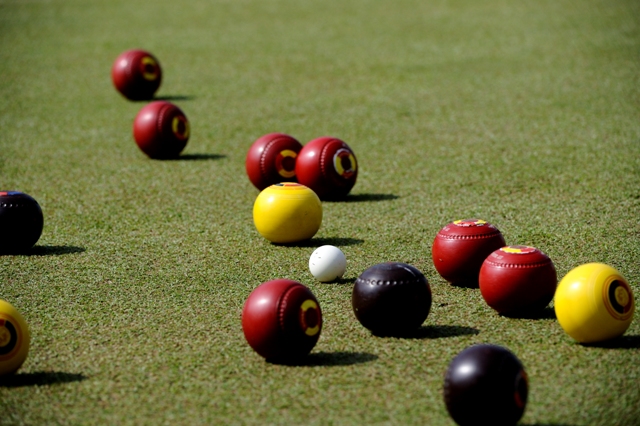 Like many games, the objective of Lawn Bowls is simple – to get one or more bowls closer to the jack than those of the opposition. It can be played by almost anyone, but to play consistently well demands determination, concentration and practice.
Like many games, the objective of Lawn Bowls is simple – to get one or more bowls closer to the jack than those of the opposition. It can be played by almost anyone, but to play consistently well demands determination, concentration and practice.
The game of Bowls is played on a 31 to 40M square of closely cut grass called the green. The green is divided into playing areas called rinks. The green is surrounded by a small ditch to catch bowls which leave the green, and a bank upon which markers indicate the corners and centrelines of each rink.
Players deliver their bowls alternately from a mat at one end of the rink, towards a small white ball called the jack at the other end. The bowls are shaped so that they do not run in a straight line, but take a curved path towards the jack.
As mentioned, the objective of the game is to get one or more bowls closer to the jack than those of the opposition – one point is scored for each counting bowl. After playing all the bowls in one direction, and agreeing the score, the direction of play is reversed – the next end is played back down the rink in the opposite direction.
To be successful the bowl must be delivered with the correct weight, along the correct line. The bowl can be delivered either forehand or backhand.
Bowls can be played as singles, or in teams of pairs, triples, or fours (a team of four is also known as a ‘rink’). The normal game formats are as follows:
- In Singles, the two opponents deliver four bowls alternately. The first to reach 21 shots is the winner.
- For Pairs, the players deliver four bowls each. The team scoring the most shots after 18 ends is the winner.
- In the Triples game, the lead, second and skip deliver three bowls each, for 18 ends.
- In Fours or Rinks play, the lead, two, three and skip each deliver two bowls for 18 ends.
Although these are the most common formats, variations are allowed by the controlling bodies. Matches may be mixed or single-sex.
In fours or rinks games, each team member has a particular role to play:
- The first, or lead, places the mat, delivers the jack and centres it before attempting to bowl as close as possible to the jack.
- The second or two will normally be required to improve or consolidate the position achieved by the lead.
- The third or three may be called upon to play different types of shots in order to score more, or to place bowls tactically to protect an advantage. The three also advises the skip on choice of shots, and agrees the number of shots scored, measuring if required.
- The skip is in overall charge of the rink, directs the other players on choice of shots, tries to build the ‘head’ of bowls to the team’s advantage and keeps the score card and scoreboard up to date.

